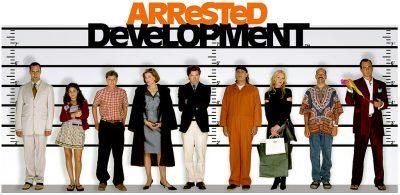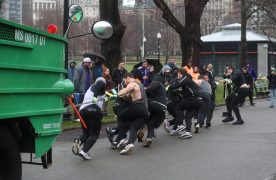
One of the hardest things for a television show to do is end.
So many beloved shows have had their reputations tainted by extra, subpar seasons that it’s almost expected from the industry at this point. Cashing in on a success rather than letting a story come to any natural conclusion is par for the course, and, in a way, it always has been.
“Arrested Development,” which started airing in 2003, passed this point a little while ago. It’s gone through five seasons, a cancellation and a revival in that time, but its new batch of episodes has shown that the series just doesn’t live up to expectations anymore.
And so, it’s time for “Arrested Development” to die. But that’s not necessarily a bad thing.
The second half of season five, which was divided and released separately as two eight-episode chunks, was released on Netflix last Friday. This is the second season released as Netflix original programming after the streaming service bought and revived the show with a fourth season back in 2013.
The second half of season five picks up right where the first half left off. Buster and Oscar are on the run after a poorly timed prison break, George Sr. and Lucille are scrambling to appease their Chinese investors, George Michael is falling deeper and deeper into his lies regarding FakeBlock, and everyone is still trying to figure out what exactly happened to Lucille Two.
There’s plenty of funny moments within these eight episodes. Intricate, farcical storylines weave and cross through each other in typical “Arrested Development” fashion. Puns and wordy jokes, references and callbacks — all the hallmarks of an “Arrested Development” season are somewhere to be found.
The showrunners have clearly listened to the feedback of their fans and made efforts to craft the show into something the audience actually wants to watch. And many of these episodes are just that — watchable. They’re not bad, they’re not great, they just sort of exist.
Characters sometimes make odd, unmotivated choices, as if the only reasons for their actions are that the writers thought it would make for a funny moment. The Bluths are caricatures, yes, but they always made decisions with a certain type of twisted logic. Unfortunately, some of that seems to be lost among these episodes.
There’s also moments where it’s clear that certain lines or entire conversations have been overdubbed. In some of these cases, the words you hear don’t even line up with the characters’ mouths at all. In other scenes, the camera sits on the listener’s face rather than the character who’s speaking for an uncomfortable and noticeably long amount of time.
“Arrested Development” is a show famous for its tight scripts and polished stories, and this mistake just feels uncharacteristically sloppy.
Unfortunately, this one issue is somewhat indicative of the season at large. The whole thing feels uncharacteristically sloppy. It doesn’t feel like “Arrested Development,” and that’s because it isn’t, really. The show is not what it once was. That’s never been more apparent than with these final episodes of season five.
With two whole seasons having failed to capture the magic of the original three, it seems clear that the show should quit while it’s ahead. Push it any more, make one more subpar batch of episodes, and the show may be beyond saving.
The last episode of season five certainly feels like a series finale. It’s nearly twice as long as any other “Arrested Development” episode has ever been, and it’s full of reconciliations and tying up of loose ends. Unlike season four, which ended with plenty of unanswered questions, season five feels tied up with a nice little bow.
“The Fallout,” the last of these final eight episodes, somehow even redeems the Bluths in a way, painting them as this happy yet dysfunctional family that’s always there for each other. And though we have five seasons worth of content to prove otherwise, it’s easy and heartwarming to believe this, if just for a moment.
Behind the scenes, it seems unlikely that the cast and crew will get together again. Reports of harassment plagued the fifth season’s press tour. David Cross has stated in recent interviews that the show is all but cancelled, and Portia de Rossi, present only for four episodes in the entirety of season five and only one in the latter half, seems intent on not returning to the show.
The thing is, it’s probably for the best. If “Arrested Development” were to call it quits here, it wouldn’t go out on a high note, no, but it could certainly be ending on a lower one.
Running the show farther into the ground would not only almost certainly tarnish its legacy but would also be be a slap in the face to devoted fans who have supported the show for so long.
All told, the second half of this fifth season of “Arrested Development” is very much like the first: a little strange, a little unfamiliar and fully and unequivocally… fine. It’s not offensively bad, and it’s not horrible television.
The real problem is that it’s still nearly impossible to watch new episodes of “Arrested Development” without thinking about how much you’d rather be watching old episodes of “Arrested Development.” That’s as much a testament to the original’s timeless hilarity as it is a knock on these new episodes.
The Netflix seasons have given fans something they never thought they would get way back in 2006 — more time with the Bluths. Unfortunately, or perhaps thankfully, after 16 long years, that time has come to a close. Or at the least, it should.













